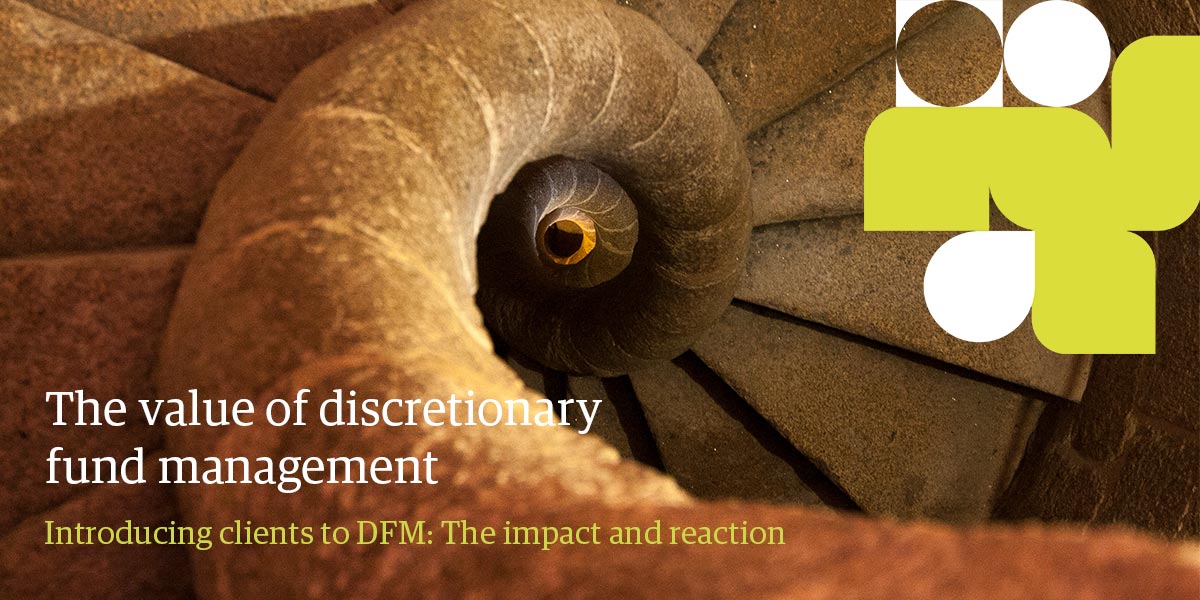Making the decision to enlist an external investment manager to manage client portfolios is, in all likelihood, a tough call for a financial adviser business - particularly if there are concerns that clients may react negatively to the change.

Introducing clients to DFM: The impact and reaction
Handing over the investment pots of hard-fought for clients can be daunting, and fears that clients may reject the new structure or even that it may undermine the value of the advice on offer can take hold when there is a dearth of evidence to highlight any of the potential advantages. Client relationships are far too important a part of an adviser business to put at risk.
Of all the fears and worries that advisers hold against DFM adoption, key among them is a fear that taking on a DFM could damage their credibility and their client relationships.
Until now there has been nothing to help ease those fears towards DFM, but the findings of the Rathbones’ Value of DFM report do much to dispel the negative perception of adoption. It revealed that rather than finding it difficult to convince clients that a shift to a DFM is the right move, the vast majority of the advisers surveyed said their clients had in fact welcomed the introduction of a third-party.
Most do not view adoption of a DFM as a weakness or a failure on the part of the adviser, instead those surveyed fed back that 97% of clients were happy for their portfolio to be managed by a third-party investment manager.
The report also helped allay concerns that incorporating a DFM structure into the business was difficult. More than three-quarters (76%) of those surveyed disagreed with a statement that their organisation ‘found it challenging to introduce third-party investment management into the business’.
The transition to a DFM appears to be far easier than many expect. Initial fears held by 64% of advisers that they would be unable to justify their fee post-adoption, or the fear of a further 36% that clients would end up entrenched with one provider, are cancelled out once the real and tangible effects of DFM adoption become clear.
While the survey reveals a positive initial reaction from clients towards taking on a DFM, the good news continues post-adoption. Just under two-thirds (63%) of advisers said that the quality of client contact improved, and 45% reported an increase in the amount of time they spent with fee-paying clients.
Advisers with DFM support spent on average 2.5 more hours per week in client meetings than non-adopters, the survey revealed, no doubt improving those all-important relationships. More than half added that clients trusted them more as a result of the shift to a third-party external manager.
Further survey results revealed improvements for investment performance.
Nearly three-quarters (72%) said investment performance had increased since shifting client portfolios to the control of a specialist investment manager. Two-thirds (66%) also said the risk/return profile of their clients had improved.
Solid investment results will obviously be the clearest way a DFM can prove their worth to a client base, in turn improving trust between advisers and clients if they feel their portfolios are in safe, well-managed and well-advised hands. The results of the survey revealed plenty of hard facts to smash the misconceptions that clients will be put off by an adviser adopting a DFM.
Judging whether a third-party investment manager is the right fit for the business is vital. Looking past the sales spiel and getting to know the investment managers, how they work and their attitude, will be vital in working out if they will be a good match for you and your clients.
As one adviser said when surveyed: “When you know the personality of the investment managers you find it easier to match them with a client. It’s a personal thing – the firm can have all the sales process and everything else but if you don’t know the manager then you don’t know if it will be a good match.”
Download the second chapter of our DFM research report - The value of discretionary fund management.

